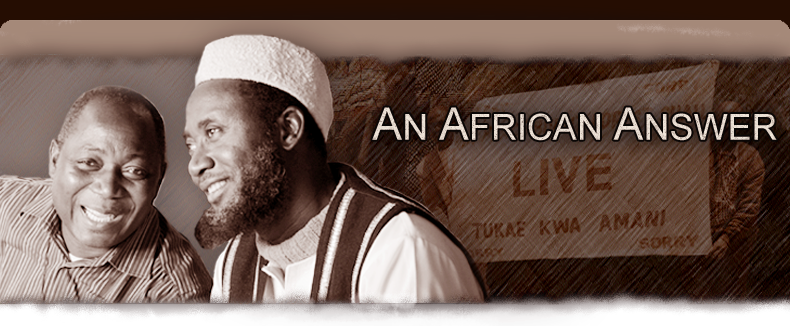Biographies of the protagonists of the film
Imam Muhammad Ashafa & Pastor James Wuye, Nigeria
The son of an Islamic scholar from a long line of Muslim clerics dating back thirteen generations, Muhammad Nurayn Ashafa grew up in a conservative family that espoused Islamic socio-cultural values and held deep suspicion for all things Western and Christian. As a young man and the eldest son, he followed the family vocation and became an Imam. To promote his family tradition of Islamic custodianship, Ashafa joined a fanatical Islamic group committed to completely Islamizing the north of Nigeria and chasing away all non-Muslims from the region. Ashafa became the leader of this militant group and also the Secretary General of the Muslim Youth Councils. The Muslim Youth Councils incited great violence in northern Nigera, which resulted in the Christians creating their own counter organization, the Youth Christian Association of Nigeria, led by Pastor Wuye.
Born in Kaduna State, Pastor James Movel Wuye, an Assemblies of God Pastor, was the son of a soldier who served in the Biafran War. From a young age, Wuye was fascinated by battle and war games. In the 1980s and 1990s he was involved in militant Christian activities and served as Secretary General of the Kaduna State chapter of the Youth Christian Association of Nigeria, an umbrella organization for all Christian groups in Nigeria, for 8 years. He recounts that his “hatred for the Muslims had no limits”. He hated seeing people being intimidated and abused, so when Muslims were blamed for inciting a violent conflict in Kaduna, he immediately volunteered to lead a reprisal attack. He lost his right arm during one of the battles against Ashafa’s militant group in Kaduna; increasing his vengeance and deep hatred for Muslims in general and Ashafa in particular.
Ashafa also experienced loss at the hands of Pastor Wuye. In one of the violent clashes between Muslim Youth Councils and Youth Christian Association of Nigeria, two cousins and Ashafa’s spiritual mentor died whilst fighting Pastor Wuye’s Christian group. For years, both Ashafa and Wuye vowed to avenge the deaths and injuries of their loved ones by killing each other. However, a chance meeting in 1995 brought the two clerics together and through intermediaries and months of soul searching, both leaders decided to lay down their arms and work together to end the destructive violence plaguing their country. This chance meeting and Imam’s extension of the olive branch to Wuye led to the formation of the Interfaith Mediation Center of the Muslim-Christian Dialogue Forum, which is headquartered in Kaduna.
Ashafa and Wuye’s collective work in peace building began in 1997. Their work has earned them numerous accolades including the Peace Activist Award of the Tanenbaum Center of Interreligious Understanding, New York; Honorary Doctorate degrees from Glasgow University, UK, and Kolkata, India; a Heroes of Peace Award from Burundi; the Search for Common Ground on Interfaith Cooperation Award, Washington DC, USA; the Bremen Peace Award from the Threshold Foundation on interreligious understanding, Germany and the inaugural Fondation Chirac award for Conflict Prevention, presented to them by former President Jacques Chirac at the Sorbonne in Paris.
Biographies of the film-makers
Alan Channer, UK – Director of An African Answer
Dr Alan Channer makes documentary films on themes of inter-cultural understanding, conflict resolution and social renewal.
Alan was born in London in 1964, the son of cameraman and producer David Channer. See obituary of David Channer in The Independent
After working as a research scientist in Africa, the South Pacific and China, Alan joined his father on a film project to foster healing and social renewal in post-war Cambodia. The resulting films were broadcast repeatedly on Cambodian television and more than one thousand videos distributed across the country. The father and son team received an award from the Cambodian government and a commendation from King Norodom Sihanouk for this work.
Most notable of Alan Channer’s films is The Imam and the Pastor (2006) - which was launched at UN Headquarters, screened at the World Bank and in the House of Commons, broadcast from Sweden to Somalia, won first prize at the Africa World Documentary Film Festival and was part of the official selection at Cinema Verite, Paris.
Alan is co-Director of For the Love of Tomorrow Films, London, together with Palestinian academic and film producer Dr Imad Karam.
Imad Karam UK and Palestine - Editor and Producer of An African Answer
Born in Gaza in 1976, Imad graduated from Al-Azhar University-Gaza. He worked as a journalist in Palestine before moving to the UK.
Imad is co-Producer of the award winning documentary film The Imam and the Pastor. After producing the Arabic version of this film, which was broadcast by Al-Jazeera, Imad travelled with Imam Ashafa and Pastor Wuye to launch the film in Lebanon, Egypt and Sudan.
Imad is co-Director of For The Love of Tomorrow Films, London, which specializes in documentary films on conflict resolution, inter-cultural understanding and social renewal.
Dr Imad Karam is also Visiting Lecturer in the Department of Sociology at City University, London, where he teaches media and international communications. His published research includes: Arab Youth, Education and Satellite Broadcasting in ‘Education and the Arab “World”: Political Projects, Struggles, and Geometries of Power’, ed. André E. Mazawi, Ronald G. Sultana, Routledge 2009, and Satellite Television: A Breathing Space for Arab Youth? in ‘Arab Media and Political Renewal: Community, Legitimacy and Public Life’, ed. Naomi Sakr, I. B. Tauris, 2007.
Production team
Narrator:
Kathleen Openda
Camera:
Robinson Malemo & Tony Biwott
Project Consultant:
Joseph Karanja
Production Assistant:
Sulaiman Shah
Production Consultant:
Dana Kahil Trometer & Mary Winstanley Channer
Editor:
Imad Karam
Post-Production:
Tarmak Films, London & InCA, Nairobi
Additional Footage:
ITN Archive & Hillary Obinda
Producer:
Imad Karam
Director:
Alan Channer
